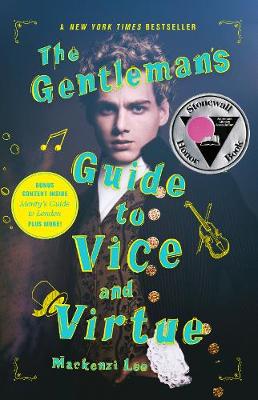 Sometimes, all we need is some hot chocolate and a fun YA historical fiction mystery loaded with twists and turns. Mackenzi Lee's novel, A Gentlemen's Guide to Vice and Virtue fits the bill. Lee exposes history in a way that's never been done before, with characters that are down-to-earth and that we can learn from. Her young characters and themes transcend time to touch modern day audiences, and remind them that there's always room for growth and understanding of oneself and others.
Sometimes, all we need is some hot chocolate and a fun YA historical fiction mystery loaded with twists and turns. Mackenzi Lee's novel, A Gentlemen's Guide to Vice and Virtue fits the bill. Lee exposes history in a way that's never been done before, with characters that are down-to-earth and that we can learn from. Her young characters and themes transcend time to touch modern day audiences, and remind them that there's always room for growth and understanding of oneself and others.
Mackenzi Lee earned her BA in history and an MFA from Simmons College in Writing for children and young adults. Years later, she's won all types of awards, including a Kirkus Prize nominee, ABA Bestseller, Stonewell Honor winner, and one of the best books of 2017 by NPR and the New York Public Library (awards she earned specifically for A Gentlemen's Guide to Vice and Virtue). Lee has appeared on the New York Times bestsellers list and in journals such as Atlas Obscura, The Boston Globe, Crixeo, and The Newport Review. A Gentlemen's Guide to Vice and Virtue is also currently being adapted for HBO by Greg Berlanti.
Especially fun about Lee's book is her close attention to history, and how she twists it. Unlike most other YA historical fiction we could name, Lee doesn't focus on a specific point in history (like either of the World Wars, for example). Instead, her characters exist within history, surrounded by the political strife of the Bourbons and the Hapsburgs, but their troubles are in no way related to political history. Instead, it feels just as if they're adventuring in modern day, just against a historical backdrop. But that's not to say Lee didn't do her research: her notes on the Grand Tour, politics, epilepsy, race relations, and queer culture in the 18th century are all spot on and reflected in the events of the novel. They're so well weaved into the story that readers feel like they're in the 18th century with Monty and his crew. We also understand Monty's, Percy's and Felicity's inner strifes against their culture because of how well Lee integrated the historical backdrop to their story.
The effectiveness of this novel lies in the abundance of fun and authenticity of the characters. Readers feel that they know Monty's and Percy's struggles with their futures and his sexualities, Felicity's troubles with her interests and her reality. Those issues are directly relatable to teen readers struggling with the exact same things. But of course, we can't go on a fun (fun?) tour of Europe while overcoming all of these things - but since we got to join Monty and his crew, readers get the adventure of a life time while exploring all of these themes right alongside the characters.
*This review can also be found on my Goodreads page*
Comments
Post a Comment